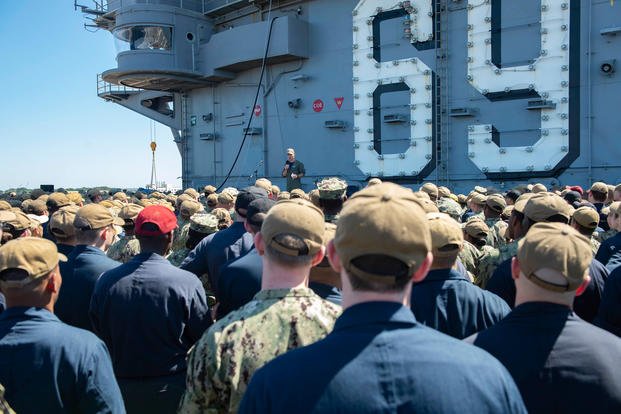With Coronavirus on 3 Ships, Navy Leaders Are Told to Cut the Mass Gatherings
There have been at least four novel coronavirus cases on three Navy ships, raising concerns that the illness could spread rampantly across a military service that packs as many as 5,000 personnel onto vessels with tight quarters.
A second sailor assigned to the amphibious assault ship Boxer tested positive for the coronavirus, named COVID-19, on Tuesday. Another sailor assigned to that ship tested positive for the illness four days prior.
Two other sailors, one assigned to the guided-missile destroyer Ralph Johnson and another with the littoral combat ship Coronado, also tested positive for the new coronavirus this week. The illness, considered a global pandemic, has sickened more than 235,000 people worldwide.
The Boxer, Ralph Johnson and Coronado are all in port on the West Coast. But the cases raised questions about what the Navy is doing to prevent the highly contagious coronavirus from sweeping through its crews.
That was especially true after photos showed that the Boxer held a family day event onboard two weeks ago, and a report from ProPublica detailed how scores of leaders were packed into the ship's wardroom after the first coronavirus case was discovered.
Navy commands have now been told they must, to the largest extent possible, avoid mass gatherings and implement social distancing whenever possible, said Lt. j.g. Rachel McMarr, a U.S. Pacific Fleet spokeswoman. The moves are necessary, she said, to protect sailors and their families, prevent the spread of coronavirus, and ensure the Navy remains ready to fight.
McMarr confirmed a "khaki call" leadership meeting occurred on the Boxer.
"Definitely not enough room to maintain appropriate distance," a sailor involved in the meeting told ProPublica. "People are wondering why we gathered in a room contradictory to [Centers for Disease Control and Prevention] guidance."
The second sailor on that ship to get coronavirus works in a different department than the first. Officials say there's no indication the sailors were in close contact aboard the ship.
Medical investigators are still working to identify any possible connections between the two cases, McMarr said.
The first sailor to get the illness was on leave during the Boxer's March 6 family day event. So far, there are no indications that anyone who attended that event brought the virus onboard, according to McMarr.
"Family day events are a good way to support the morale of our sailors and families, allowing them an inside view of life aboard the ship," she added. "Family day events are a regular occurrence aboard Navy commands."
When asked whether he believes the Navy is doing enough to fight the spread of coronavirus on ships, the service's surgeon general, Rear Adm. Bruce Gillingham, said Thursday that he does.
"We've only had a very small handful of cases of sailors assigned to ships," Gillingham told reporters. "We are watching that very carefully; our environmental preventive medicine officers and medical officers aboard those ships are taking every measure recommended by the CDC to make sure that we limit the potential spread of the virus."
Top Navy brass in the Washington, D.C., area have been aggressively setting new policies to combat potential coronavirus spread. That includes delaying selection boards, advancement exams, fitness tests and other events that could put a bunch of sailors in crowded spaces together.
The service also relaxed hair regulations to cut down on the time sailors or officers might need to spend at the barber or salon.
In the fleet, McMarr said leaders are taking the threat of the virus on ships very seriously. Cleaning is even more rigorous than normal, she said, and commanders are encouraged to connect with their crews electronically rather than pulling a large crowd into one space.
Emails, memos, social media town halls and communicating over the ship's announcement system are all encouraged.
"To the max extent possible, we're implementing the social distancing and CDC guidance," one Navy official said. "But ships still have to operate."
© Copyright 2020 Military.com. All rights reserved. This material may n



No comments:
Post a Comment